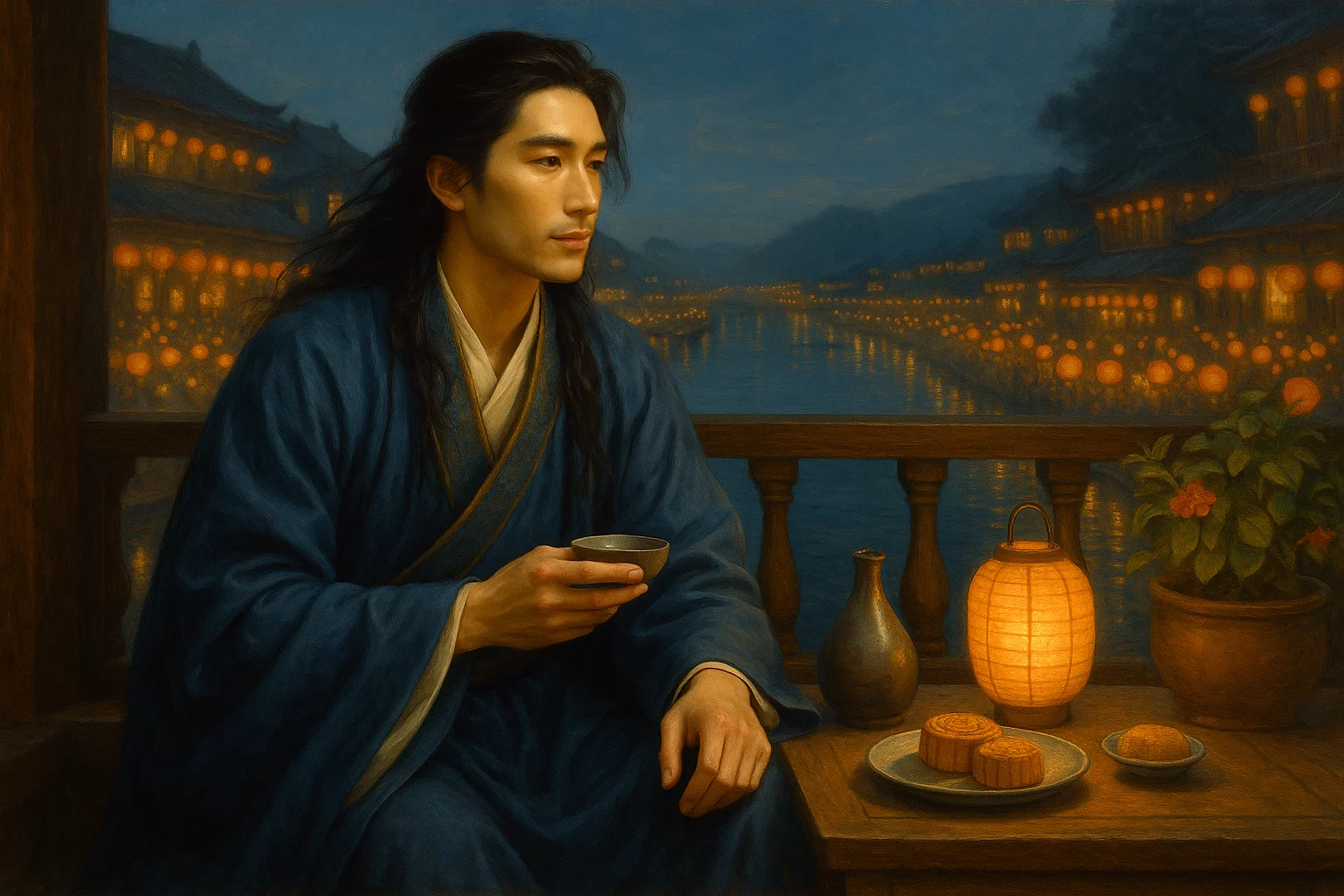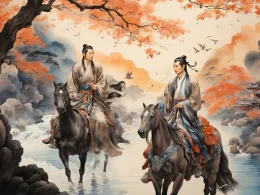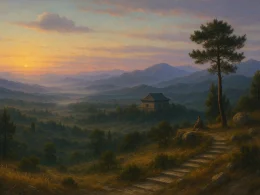Waves ebb from chilly shoals,
At dusk the village ferry waits—
Afar, a few small sails.
Leaves whirl as startled crows take flight,
Sudden wind scatters wild geese,
A lone cloud drifts at heaven's edge.
The official willows, gaunt and bare,
Still clutch the last faint light—
Why cling so?
Scenes stir the heart,
River views shift—
All hasten age.
My wild friends now seldom cheer,
Yet still I'm bound by silken ties of love.
The zither's soul within the feast,
The brocade's verse within the loom—
These haunt my thoughts the most.
I know someone waits long,
As roses fade—
Will she smile at my return?
I dreamt of Gaotang's cloud,
But dawn's frost came too soon.
Original Poem
「氐州第一 · 波落寒汀」
波落寒汀,村渡向晚,遥看数点帆小。
乱叶翻鸦,惊风破雁,天角孤云缥缈。
官柳萧疏,甚尚挂、微微残照?
景物关情,川途换目,顿来催老。渐解狂朋欢意少,奈犹被、丝牵情绕。
周邦彦
座上琴心,机中锦字,觉最萦怀抱。
也知人、悬望久,蔷薇谢,归来一笑。
欲梦高唐,未成眠、霜空已晓。
Interpretation
Composed by Zhou Bangyan during his journey from Chang'an to Bianjing in late autumn, this ci poem captures a moment of profound reflection at a desolate village ferry. Witnessing the bleak twilight scenery from his boat, the poet contemplates life's transience and aging. Amidst impending farewells to friends and anticipation of a lover's reunion, his solitary travels intertwine with longing, inspiring this introspective work. The seamless fusion of natural imagery and human emotion exemplifies Zhou's signature restrained lyricism, where delicate sentiment and vivid scenery merge into poetic harmony.
First Stanza: "波落寒汀,村渡向晚,遥看数点帆小。乱叶翻鸦,惊风破雁,天角孤云缥缈。官柳萧疏,甚尚挂、微微残照?景物关情,川途换目,顿来催老。"
Bō luò hán tīng, cūn dù xiàng wǎn, yáo kàn shǔ diǎn fān xiǎo. Luàn yè fān yā, jīng fēng pò yàn, tiān jiǎo gū yún piāo miǎo. Guān liǔ xiāo shū, shèn shàng guà, wēi wēi cán zhào? Jǐng wù guān qíng, chuān tú huàn mù, dùn lái cuī lǎo.
Waves lap cold sandbars;
village ferry at dusk;
distant sails dot the horizon.
Leaves whirl, startling crows;
sudden winds scatter wild geese;
lone clouds drift at sky's edge.
Roadside willows stand sparse,
still clinging to fading twilight—
scenes that stir the heart,
the river's shifting vistas
suddenly hasten age.
Second Stanza: "渐解狂朋欢意少,奈犹被、丝牵情绕。座上琴心,机中锦字,觉最萦怀抱。也知人、悬望久,蔷薇谢,归来一笑。欲梦高唐,未成眠、霜空已晓。"
Jiàn jiě kuáng péng huān yì shǎo, nài yóu bèi, sī qiān qíng rào. Zuò shàng qín xīn, jī zhōng jǐn zì, jué zuì yíng huái bào. Yě zhī rén, xuán wàng jiǔ, qiáng wēi xiè, guī lái yī xiào. Yù mèng gāo táng, wèi chéng mián, shuāng kōng yǐ xiǎo.
Now see my wild friends
rarely share their joy—
yet silken threads of longing
still bind my soul.
Her zither's whisper on the seat,
brocade words in the loom—
these haunt me most.
I know she waits, suspended,
as roses wilt—for my return
and one shared smile.
I longed to dream of Gaotang,
but frost-dawn pierced the night
before sleep came.
Holistic Appreciation
The poem masterfully interweaves scene and sentiment. The first stanza constructs a desolate autumn riverscape through layered imagery—near views (sandbars, ferry), distant vistas (sails, clouds), and celestial elements (wild geese)—progressively building an atmosphere of solitary bleakness. The poet's keen observation of nature's decay directly triggers his lament over fleeting youth, with "suddenly hasten age" crystallizing the fusion of external scenery and internal melancholy.
The second stanza shifts to profound lyricism, transitioning from landscape to emotional world. The opening lines reveal loneliness in fading friendships alongside persistent romantic attachment. "Zither's whisper" and "brocade words" materialize longing through tangible mementos, while the imagined lover's patience ("as roses wilt") amplifies the poignancy of separation. The concluding unrealized Gaotang dream, shattered by dawn's frost, adds a layer of quiet desolation to the poet's yearning.
Autumn winds, scattered leaves, startled birds, and solitary clouds mirror the poet's state of mind, creating a natural unity where restrained grace and profound sorrow coexist. Scenery and emotion reflect each other throughout, showcasing Zhou Bangyan's artistic mastery and philosophical depth.
Artistic Merits
- Exquisite Scenic Depiction
Vivid portrayals of autumn elements—chilly sandbars, village ferries, sparse willows, startled crows, scattered geese—blend near and distant perspectives into richly layered imagery. - Scene-Emotion Fusion Triggering Reflection
Autumn's desolation naturally evokes life contemplations, transitioning seamlessly from scenery to sentiment in progressive emotional layers. - Subtle Allusions and Concise Language
Classical references like "zither's whisper" and "brocade words" convey profound longing without explicit sentimentality through economical phrasing. - Tight Structure with Dual Narrative
The first stanza establishes mood through landscape; the second develops emotional depth through personal narrative, creating a cohesive thematic progression.
Insights
This ci reminds us that life resembles autumn scenery—filled with impermanence and desolation. As years hasten aging and friendships fade, only genuine affection endures. Zhou Bangyan's lyrical scene-emotion fusion captures the solitude and anticipation of life's journey, teaching us to cherish people and relationships amidst constant change. His technique of expressing emotion through scenery demonstrates how to achieve artistic unity between poetic conception and craft, offering inspiration for modern literary creation and life reflection alike.
About the Poet

Zhou Bangyan (周邦彦 1056 - 1121), a native of Qiantang (modern Hangzhou, Zhejiang), was the culminating master of the wanyue (graceful and restrained) ci poetry of the Northern Song Dynasty. A virtuoso in musical temperament, his ci are renowned for their opulent refinement and technical perfection. He created dozens of new melodic patterns (cipai) and adhered to strict tonal rules, earning him the title "Crown of Ci Poets." His influence extended to Southern Song masters like Jiang Kui and Wu Wenying, establishing him as the founding patriarch of the Rhymed Ci School.












